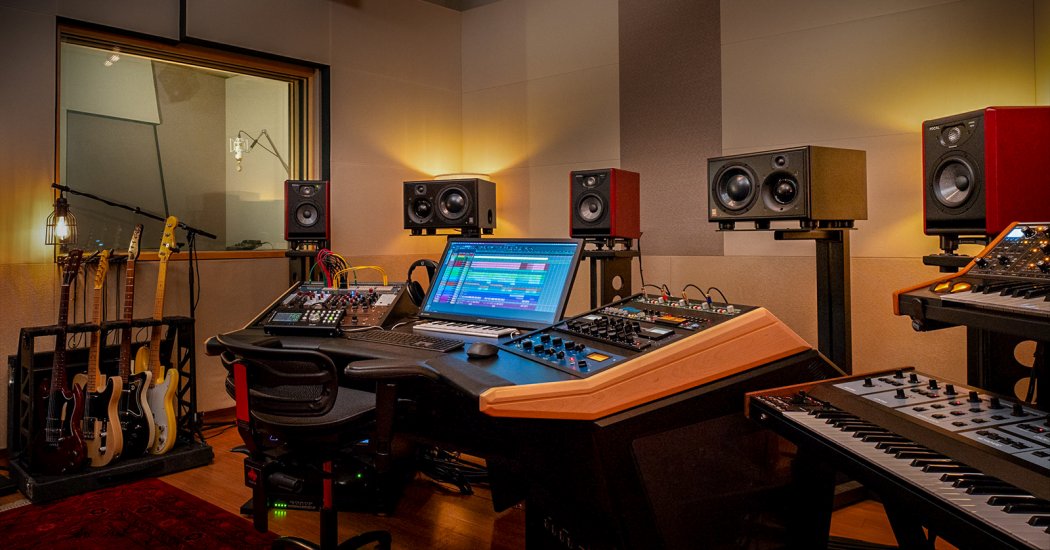
Sweetwater Studio C, photography by Tom Edwards
Being in the studio can be a lot of fun. Or it can be work — hard work. Which one it is depends largely on factors that happen before you ever walk into the studio. Some of the factors are gear-related, but many of them aren’t about gear. In my 40 years of working in studios, both my own and those of others, I learned many techniques for improving my workflow, and ultimately my productivity, for the hours or days I would spend there. Here are some techniques I found that worked for me.
- Have Your Tools Where You Need Them, Ready to Go
- Eliminate Distractions
- Get a Patchbay
- Find Gear That Works Well and Lock It Down
- Set Realistic Goals and Deadlines
- Simplify and Label Things (So You Can Focus on Important Stuff)
- Recognize Your Technical Limitations
- Know Your Tools So Well That They Become Extensions of You
- Get an Intern or Assistant
- Don’t Wish-list While You Work
Have Your Tools Where You Need Them, Ready to Go
Having the right tools right on hand is probably the biggest factor when it comes to being productive. If you want to jot down a musical idea for a song, then having a tuned guitar or keyboard within arm’s reach is crucial. If you need to lay down a scratch track vocal or a keeper, then having a mic ready so you can walk in and sing — versus getting a mic out of the closet, putting it on a stand, running a cable, setting up headphones, etc. — can be the difference between getting the take and not. The same is true of tracking, mixing, mastering — any music production discipline. Keep instruments, tuners, throat spray, water bottles, sharpened pencils, capo, all close at hand. Always be prepared when inspiration strikes.
Eliminate Distractions
Focusing on the task at hand is a great way to truly maximize your productivity, and the best way to do that is by eliminating distractions. When I mixed for a living in my home studio, I always cleared everything off my mixing desk so there were no distractions. As a sole proprietor, this can be challenging because there are always messages and emails to reply to, mail to open, taxes to pay, and more. The to-do list is never-ending. I had to learn to figuratively pull a curtain between A) the mixing that paid the bills and B) running the business. Otherwise, they each distracted me from the other. As a creative, it worked better for me to clearly and visually divide those two.
Get a Patchbay
If you’ve ever gone cable diving behind your racks, then you know how time-consuming and frustrating that can be. Imagine if all your inputs and outputs were right there, only an arm’s length away. That’s why you need a patchbay! Have you ever seen a professional studio that didn’t have a patchbay? Of course not, because they have important work that needs to be done quickly, and nobody has time to be crawling around behind outboard gear. Get a patchbay. It’ll save you hours upon hours of time. You’ll thank me later.
Another timesaving trick is hardwiring things where you normally use them. As a full-time mixer, I found a magic combination of processors (DAC, EQ, compressor, ADC) that gave me a sound I loved, that I used on all my mixes. I finally patched that chain across the main stereo outs, and it lived there when I was mixing. I never had to repatch or think about it at all.
Find Gear That Works Well and Lock It Down
Have you ever wondered how Rick Beato cranks out so many videos? Or how Chris Lord-Alge can finish a mix so fast? First, it’s pure talent, but don’t underestimate the impact of having trusted signal chains, reliable tools, and a dedicated space at the ready. Having the right tools in the right space means you’re already halfway there before you even start recording.
People used to ask me how long it would take to get sounds on a 50-piece orchestra including a full rhythm section. “I can spend hours on the drums, so it must take all day to dial in the sounds on 60 mics!” They were always shocked when I answered, “I usually get one pass through the song, maybe two. So, about 10 minutes?” Finding the right mics and putting them in the right places are requirements for that discipline. A roomful of union musicians is way too expensive for experimentation. You find tools that work and rely on them.
Set Realistic Goals and Deadlines
As a professional, you have to learn how to budget your time based on the resources and time allowed. If a customer needs you to do a mix and can only afford a few hours of your time, then you have to be realistic about how long it will take and set deadlines accordingly. There are reasons that record labels always put deadlines on recording projects. Otherwise, musicians will never finish them. We used to joke that there are two reasons that a record is truly done: 1) you run out of money, or 2) you run out of time. If you have to finish mixing three songs in a day, then you can’t spend 16 hours on the first song.
If your goal is to put a bass line on a song and you only have an hour, then you can’t spend the whole hour picking which bass or bass synth plug-in to use. Be honest with yourself in terms of how much time you have and how that time should be spent.
It may sound utilitarian, but here’s a trick I learned when mixing jingles and there was a plane leaving at 9PM to get the demo to the New York client on time. If we missed the deadline, then the plane left without our tape and we lost that big account. Here’s the trick: Set a timer with an alarm. Do the best, fastest work you can, and when the timer goes off, you’re done. Print it. There’s nothing quite as motivating as racing the clock.
Simplify and Label Things (So You Can Focus on Important Stuff)
For decades, I worked in studios all over Nashville. On any given day, I could be working on an SSL 4000 or a 9K; the next day was a Trident A-Range, Trident 80B, a Neve 8068, MCI 528, API Legacy, Helios, or any number of other consoles. I learned early on to label (with console tape) where all the headphone feeds originated and where all the aux sends were going (Plate 1, Plate 2, Echo Chamber, Lexicon 480L). That way, I didn’t have to ask what went where more than once. It enabled me to work much faster. It may have only saved me a few seconds every time I wanted to adjust something, but over the course of a day, it adds up.
Recognize Your Technical Limitations
This is a big one, especially when it comes to accomplishing your goals. When a songwriter wants to get a song idea down fast and asks me about getting a computer and a DAW to do it, I discourage them. DAWs are fabulous and powerful pieces of technology, but unless your goal is dealing with software updates, software conflicts, tech support, driver installation, viruses, and more, then you’re better off with a standalone recorder. I’ve known so many writers who want to get ideas down at home and then a year later found out that they spent most of their time dealing with computer issues instead of writing songs. Carefully define what it is you want to accomplish and choose the best tool for that job.
Know Your Tools So Well That They Become Extensions of You
As a power user, I frequently found that I discovered things about the software I used that even the software designers themselves didn’t know. That only comes with experience. Learn your tools. Use them until they become extensions of yourself. An experienced craftsperson with the right tool can always achieve superior results. Take the time to learn the limitations of your gear and your instruments, and then you can learn how to work around them or, better yet, use them to your advantage.
Get an Intern or Assistant
Wanting another perspective, I reached out to Shawn Dealey, Chief Engineer at Sweetwater Studios, and he replied, without hesitation, “Get an intern.” There’s an old saying applicable to the studio: “Many hands make light work.” It’s incredibly helpful to have someone who can help set up, help tear down, get there early, and stay late with you — someone who can finish up when you’re spent or clean up when you need to bail. Plus, you can pass along your knowledge to your intern and invest in their future. A second set of ears — good ears — is always nice to have around.
Don’t Wish-list While You Work
Finally — and this is sort of a corollary to #2 (eliminate distratctions) — at Sweetwater, we love showing you different keyboards, or guitars, or preamps, or microphones and helping you plan your next purchase. Giving you access to the tools of your dreams is why we’re here!
And it’s true that there’s a time for everything! But, for productivity’s sake, work on music while you’re in the studio and browse for your lust list of gear on breaks or after you finish making music.
Make It Work!
Want to optimize your studio workflow, audio quality, and productivity? Call us! Sweetwater’s Sales Engineers have endless experience working in, designing, equipping, and consulting great studios. We love talking about this stuff just as much as you do. Ring us up at (800) 222-4700. We can hook you up with everything you need to make your studio work and sound better.



